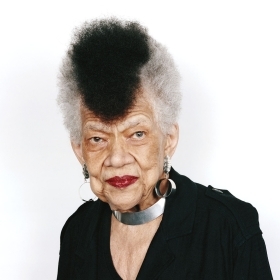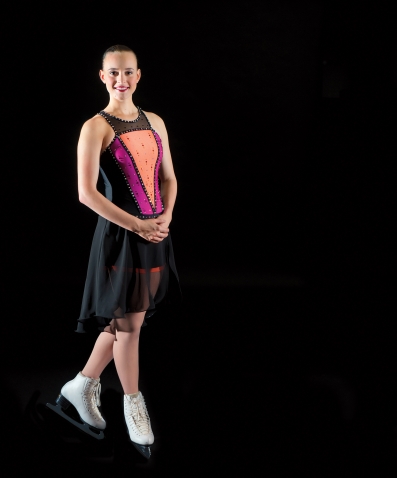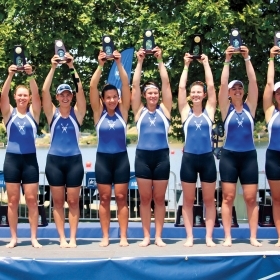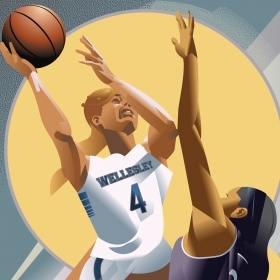Photo by Richard Howard
Eliana Marostica ’18 understands the importance of time—being in time, being on time, and being able to find time. In addition to the demands of being a computer-science major with a pre-med focus, she’s also a world-championship class synchronized skater with the Haydenettes, the 2016 U.S. national champions. Synchronized skating involves a team of ice skaters performing in unison, combining the elements of traditional singles and pairs figure skating with ice dancing and technical aspects unique to the sport. A skater since she was just 4 years old, Marostica discovered synchronized skating when she moved from Texas to Wellesley, Mass., when she was 11.
16
Marostica’s team, the Haydenettes, competes at the highest level of the sport, and 16 skaters take the ice at the same time, striving to achieve unison and connection in their performance. There are jumps and lifts, just as in singles and pairs skating. “Even if people are doing different things, even if they’re not necessarily [skating the same move] at the same time, they have to be unified,” Marostica says.
4:30
Earlier this year, the Haydenettes had four minutes and 30 seconds to perform their free skate (known as the long program) at the World Skating Championships in Budapest. Entering the free skate, the team was in fourth place. “Going into it, we definitely were feeling much more prepared as a team than we had been in past years, when we didn’t place,” Marostica says. The team ended up with the highest score in the free skate portion, earning a gold medal for that performance, and a bronze medal overall.
Skate Through the Day
“We skate together about four to five times a week, but outside of that, we’re also expected to skate individually, and that usually includes private lessons,” Marostica says. “We’re also expected to train off the ice.” There is no typical day for Marostica, but there are days when she gets up before an 8:30 a.m. class to skate in Lexington or Marlborough, Mass., goes to class, skates on her own some more, and then heads off for a team practice that can last up to three hours (not including travel time). “It’ll vary depending on the week, but probably 25 to 30 hours a week for skating,” she says. “And then the rest is spent usually on studying.” When you add competitions (domestic and international) to the schedule, Marostica ends up studying wherever she can: in between skates at a competition, on airplanes, in hotels.
When she wasn’t skating this summer (her team was already preparing for next year’s national championships and hopefully, another run at a world medal), Marostica interned at the Dana-Farber Cancer Institute. There, she started working on a systematic review on the incidence and survival rates of childhood cancers in low- and middle-income countries, a project that she has continued working on this fall at Wellesley as an independent research course. “Even when I stop synchronized skating as an athlete, I’ll still be involved in the sport,” she says. “One of my goals is to travel with the synchronized skating teams as a team physician.”








We ask that those who engage in Wellesley magazine's online community act with honesty, integrity, and respect. (Remember the honor code, alums?) We reserve the right to remove comments by impersonators or comments that are not civil and relevant to the subject at hand. By posting here, you are permitting Wellesley magazine to edit and republish your comment in all media. Please remember that all posts are public.